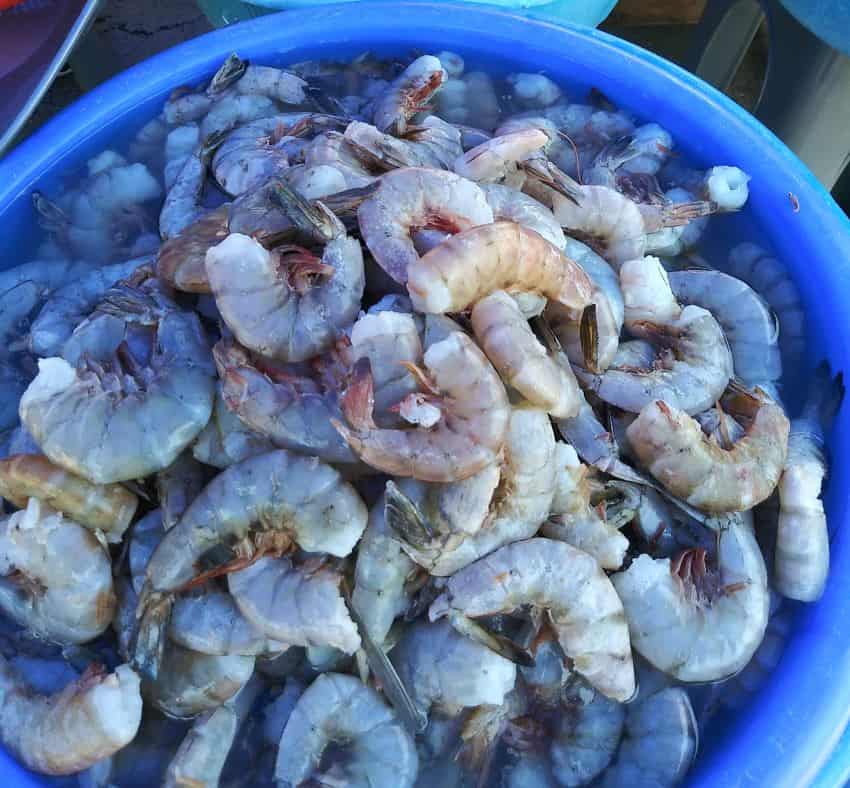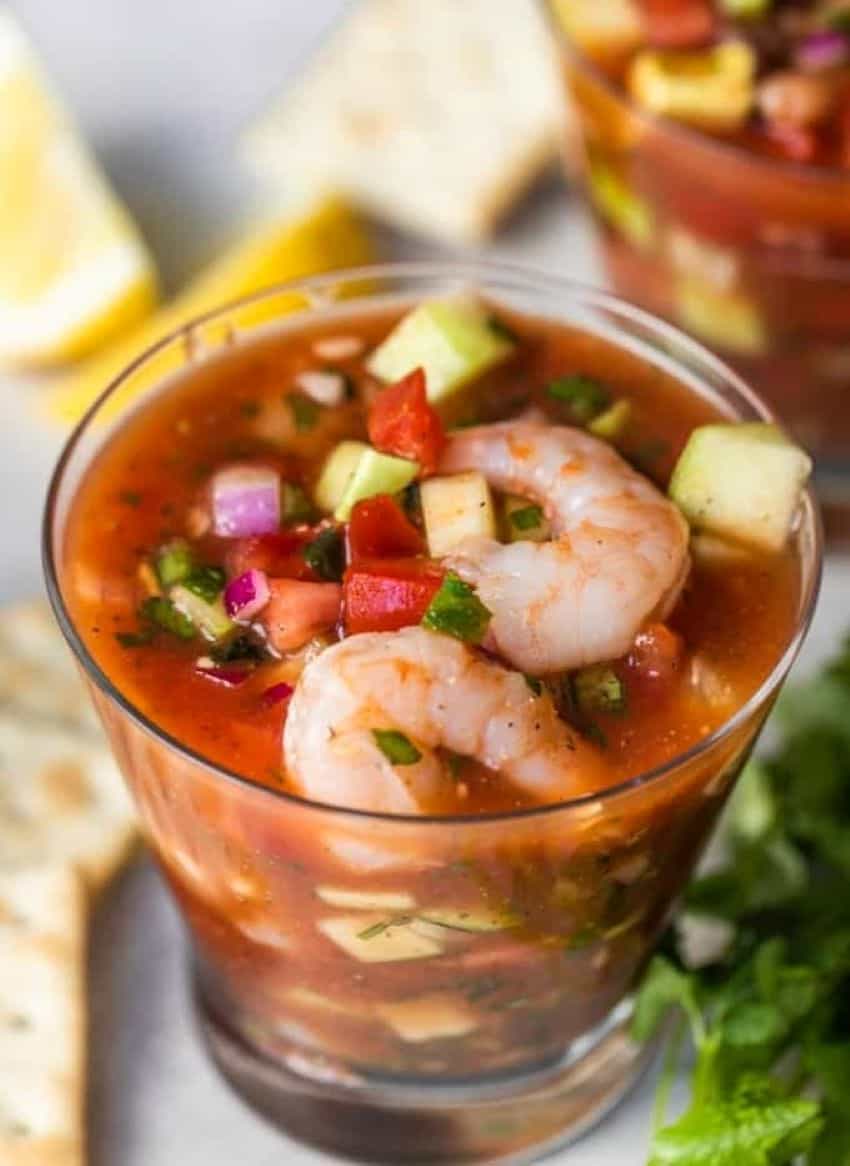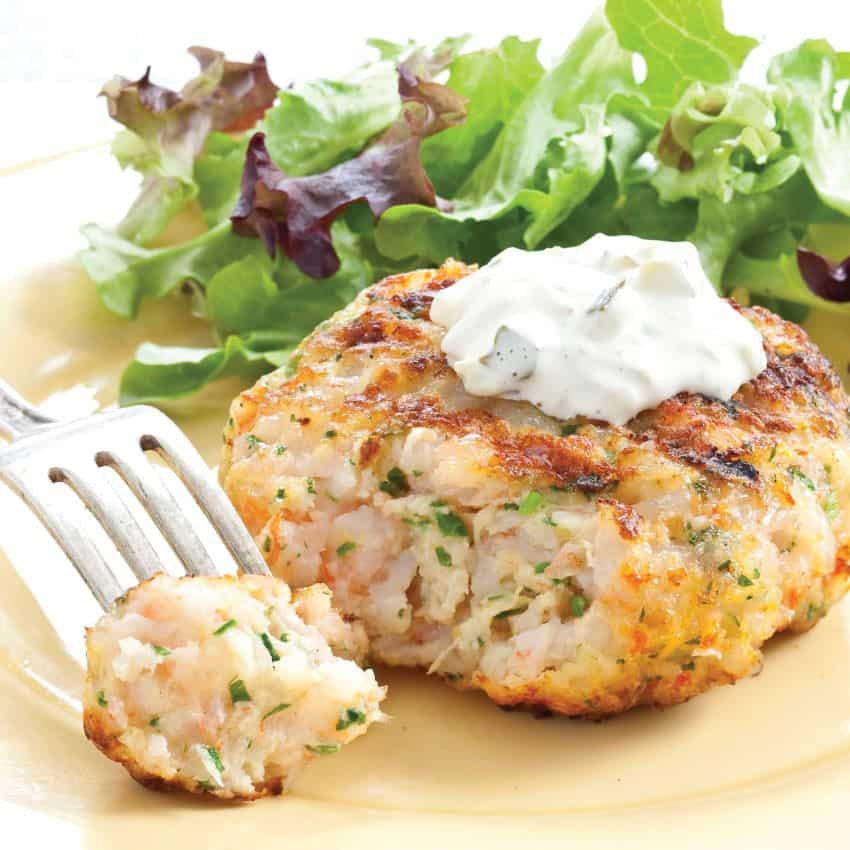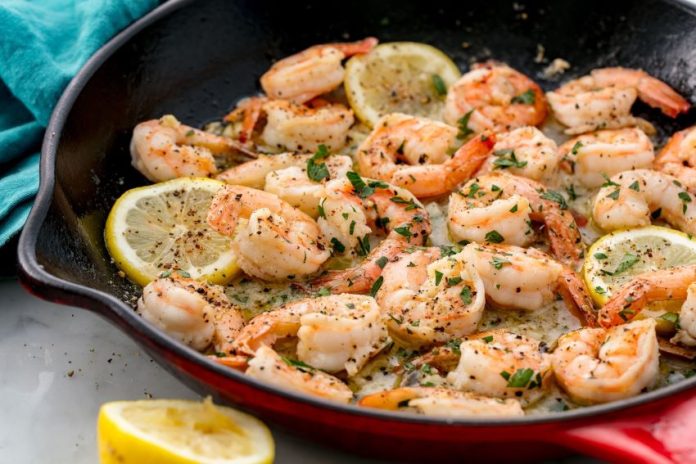Living in Mazatlán, I tend to take shrimp for granted. There are shrimp cocktails, ceviches and aguachile; omelettes, tacos and burgers; soups, paella and a host of other entrées and appetizers. (Coconut shrimp? Everywhere.)
And it’s affordable: while prices fluctuate a little with the season, the cost of shrimp is usually somewhere between chicken and steak. Mazatlán, you see, is the shrimp capital of the world, with more than 40,000 tonnes of shrimp caught annually.
White, brown and pink shrimp are the most common species in Mexico. Farmed shrimp (camarón de granja) are available year-round and can be a bit less expensive than the more flavorful wild shrimp, caught by big trawlers that go to sea for weeks at a time between October and April.
These boats flash-freeze the shrimp at sea in 4-lb. blocks separated by size. This is the most economical way to buy wild shrimp. Small pangas or other boats that return each day also catch shrimp in season.
Shrimp has a well-deserved reputation as being tricky to buy, prepare and cook. Understanding some basics will help even the seasoned cook navigate these pitfalls.
Like any seafood, freshness is key. Look for shrimp that are firm, not slimy, and without an ammonia-like odor. Avoid shrimp that are falling apart or limp. With shrimp that still has its head on, there should be no black spots on the head or body — these indicate oxidation and that the shrimp are not at their peak freshness. That said, pink shrimp will have bluish spots or coloring near the tail, which is completely fine.

Most of the “fresh” shrimp you find in grocery stores, mercados or fish markets is just frozen shrimp that’s been defrosted — you’re better off just buying a bag of frozen shrimp and defrosting them yourself.
To thaw, put frozen shrimp directly into a bowl of cold running water. In a few minutes, they’ll be ready to use. Pat them dry with paper towels before proceeding.
To clean, slit the curved back of the shrimp with a small sharp knife and remove the “vein” (really its digestive tract) and rinse well.
There’s good reason to buy shrimp without heads: Within hours of dying, shrimp heads release enzymes that break down the flesh and turn it mushy. Headless shrimp will keep that elusive “fresh, briny crunch.”
If you buy live shrimp, remove the heads as soon as possible. You do want the shells, though; they contain lots of sweet shrimp-y flavor and yield that trademark reddish tint when grilled or cooked.
As far as cooking, in this case, less is more. Shrimp only need a few minutes of heat to be cooked through; more than that and they turn rubbery. A dry brine (see Coctel de Camarón, below) can also help keep them plump and juicy. Check out these detailed, tested instructions on how to grill shrimp.

Aguachile
- ½ kilo medium shrimp, shells and heads removed
- Salt and pepper
- 2 serrano chiles, seeded and cut into ¼-inch pieces
- 2 Tbsp. water
- 4 Tbsp. fresh lime juice
- ¼ cup thinly sliced red onion
- 3 Tbsp. diced or sliced cucumber
- For serving: tostadas and sliced avocado
Split shrimp in half lengthwise, remove veins. Transfer to a plate, sprinkle all over with salt, cover with plastic, and refrigerate at least 1 hour and up to 2.
Using a mortar and pestle, pulverize chiles with pinch of salt. Add water, continue mashing until chiles are tiny bits. (Or blend them with water in a blender.) Add lime juice; season with salt and pepper.
In a bowl, toss shrimp with the chile-lime marinade, onion and cucumber. Adjust seasoning. Serve immediately with tostadas and avocado.
Coctel de Camarón
Starting the shrimp cooking in cold water and poaching them at not more than 170 F after a quick dry-brining produces plump, juicy shrimp.
- 1¾ lbs. shrimp, shelled and deveined
- 2 Tbsp. plus 1 tsp. salt, divided
- ½ tsp. baking soda
- 6 Tbsp. fresh lime juice, divided, plus more as needed
- 1 cup diced white onion
- ¾ cup tomato puree
- ½ cup ketchup
- 3 Tbsp. chopped cilantro
- 2 Tbsp. fresh orange juice
- 1 jalapeño or serrano pepper, seeded and minced
- For serving: saltines, diced avocado, hot sauce
In a large bowl, toss shrimp with 1 tsp. salt and the baking soda until evenly coated. Transfer to refrigerator for 15 minutes.
In another bowl, mix 4 Tbsp. lime juice with onion, tomato puree, ketchup, cilantro, orange juice and jalapeño/serrano.
In a saucepan, combine 2 quarts cold water with remaining 2 Tbsp. lime juice and 2 Tbsp. salt. Add shrimp, turn heat to medium-high, and cook, stirring occasionally, for a few minutes until temperature reaches 170°F and shrimp are just cooked through.
Drain shrimp, rinse under cold running water, drain again. Cut shrimp into ½-inch pieces. Add shrimp to bowl with sauce; stir. Add more lime juice if desired. Top with avocado and serve immediately with crackers and hot sauce. — seriouseats.com

Garlic Shrimp
So easy! Enjoy as an entrée or in tacos.
- 1 lb. shrimp, cleaned and shelled
- 5 Tbsp. butter
- 2 Tbsp. olive oil
- ¼ onion, sliced
- 5 cloves garlic, minced
- 3 Tbsp. cilantro, chopped
- Juice of 2-4 limes
- ¼ tsp. ground cumin
- Salt and pepper
Season shrimp with salt, pepper, cumin. Heat butter and oil in frying pan over medium-low until butter begins to melt; add garlic and onion, sauté 5 minutes.
Add shrimp, cook 5–8 minutes or until just cooked through. Add lime juice and parsley.
Shrimp Burgers
- 1 lb. shrimp, deveined and cleaned
- 2 Tbsp. minced scallions
- 3 Tbsp. diced celery
- 2 Tbsp. chopped parsley/cilantro
- 1½ tsp. lemon/lime zest
- 3 Tbsp. mayonnaise
- 1 cup Panko or bread crumbs
- 1 egg, beaten
- Salt and pepper
- Tabasco
- 1 Tbsp. coconut or olive oil
Boil shrimp for two minutes. Drain, then pile ice on top until cool enough to handle. Chop into small dice.
In a large bowl, mix shrimp with scallions, celery, parsley/cilantro and zest.
Add mayonnaise, bread crumbs and egg. Mix well. Season with salt, pepper and Tabasco to taste.
Form six patties about three inches in diameter. Sauté in oil until both sides are browned.
Drain on paper towels. Serve as patties or on buns with all the fixin’s.
Janet Blaser is the author of the best-selling book, Why We Left: An Anthology of American Women Expats, featured on CNBC and MarketWatch. A retired journalist, she has lived in Mexico since 2006.
